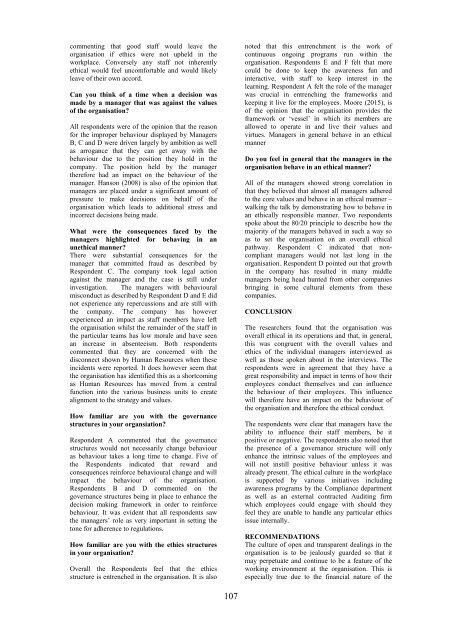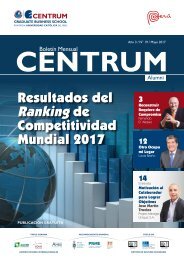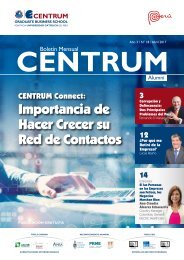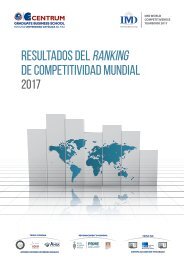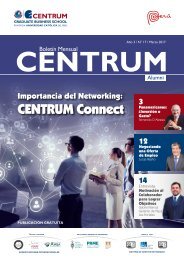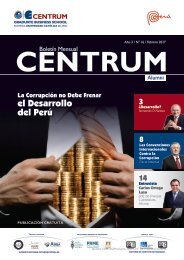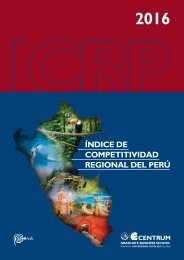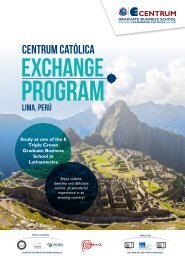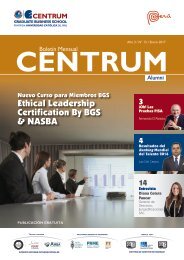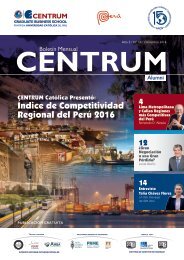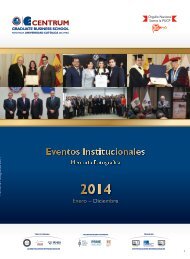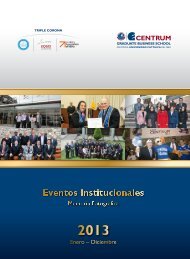Pan-Pacific Conference XXXIV. Designing New Business Models in Developing Economies
This publication represents the Proceedings of the 34th Annual Pan-Pacific Conference being held in Lima, Peru May 29-31, 2017. The Pan-Pacific Conference has served as an important forum for the exchange of ideas and information for promoting understanding and cooperation among the peoples of the world since 1984. Last year, we had a memorable conference in Miri, Malaysia, in cooperation with Curtin University Sarawak, under the theme of “Building a Smart Society through Innovation and Co-creation.” Professor Pauline Ho served as Chair of the Local Organizing Committee, with strong leadership support of Pro Vice-Chancellor Professor Jim Mienczakowski and Dean Jonathan Winterton.
This publication represents the Proceedings of the 34th Annual Pan-Pacific Conference being held in Lima, Peru May 29-31, 2017. The Pan-Pacific Conference has served as an important forum for the exchange of ideas and information for promoting understanding and cooperation among the peoples of the world since 1984. Last year, we had a memorable conference in Miri, Malaysia, in cooperation with Curtin University Sarawak, under the theme of “Building a Smart Society through Innovation and Co-creation.” Professor Pauline Ho served as Chair of the Local Organizing Committee, with strong leadership support of Pro Vice-Chancellor Professor Jim Mienczakowski and Dean Jonathan Winterton.
Create successful ePaper yourself
Turn your PDF publications into a flip-book with our unique Google optimized e-Paper software.
comment<strong>in</strong>g that good staff would leave the<br />
organisation if ethics were not upheld <strong>in</strong> the<br />
workplace. Conversely any staff not <strong>in</strong>herently<br />
ethical would feel uncomfortable and would likely<br />
leave of their own accord.<br />
Can you th<strong>in</strong>k of a time when a decision was<br />
made by a manager that was aga<strong>in</strong>st the values<br />
of the organisation?<br />
All respondents were of the op<strong>in</strong>ion that the reason<br />
for the improper behaviour displayed by Managers<br />
B, C and D were driven largely by ambition as well<br />
as arrogance that they can get away with the<br />
behaviour due to the position they hold <strong>in</strong> the<br />
company. The position held by the manager<br />
therefore had an impact on the behaviour of the<br />
manager. Hanson (2008) is also of the op<strong>in</strong>ion that<br />
managers are placed under a significant amount of<br />
pressure to make decisions on behalf of the<br />
organisation which leads to additional stress and<br />
<strong>in</strong>correct decisions be<strong>in</strong>g made.<br />
What were the consequences faced by the<br />
managers highlighted for behav<strong>in</strong>g <strong>in</strong> an<br />
unethical manner?<br />
There were substantial consequences for the<br />
manager that committed fraud as described by<br />
Respondent C. The company took legal action<br />
aga<strong>in</strong>st the manager and the case is still under<br />
<strong>in</strong>vestigation. The managers with behavioural<br />
misconduct as described by Respondent D and E did<br />
not experience any repercussions and are still with<br />
the company. The company has however<br />
experienced an impact as staff members have left<br />
the organisation whilst the rema<strong>in</strong>der of the staff <strong>in</strong><br />
the particular teams has low morale and have seen<br />
an <strong>in</strong>crease <strong>in</strong> absenteeism. Both respondents<br />
commented that they are concerned with the<br />
disconnect shown by Human Resources when these<br />
<strong>in</strong>cidents were reported. It does however seem that<br />
the organisation has identified this as a shortcom<strong>in</strong>g<br />
as Human Resources has moved from a central<br />
function <strong>in</strong>to the various bus<strong>in</strong>ess units to create<br />
alignment to the strategy and values.<br />
How familiar are you with the governance<br />
structures <strong>in</strong> your organsiation?<br />
Respondent A commented that the governance<br />
structures would not necessarily change behaviour<br />
as behaviour takes a long time to change. Five of<br />
the Respondents <strong>in</strong>dicated that reward and<br />
consequences re<strong>in</strong>force behavioural change and will<br />
impact the behaviour of the organisation.<br />
Respondents B and D commented on the<br />
governance structures be<strong>in</strong>g <strong>in</strong> place to enhance the<br />
decision mak<strong>in</strong>g framework <strong>in</strong> order to re<strong>in</strong>force<br />
behaviour. It was evident that all respondents saw<br />
the managers’ role as very important <strong>in</strong> sett<strong>in</strong>g the<br />
tone for adherence to regulations.<br />
How familiar are you with the ethics structures<br />
<strong>in</strong> your organisation?<br />
Overall the Respondents feel that the ethics<br />
structure is entrenched <strong>in</strong> the organisation. It is also<br />
noted that this entrenchment is the work of<br />
cont<strong>in</strong>uous ongo<strong>in</strong>g programs run with<strong>in</strong> the<br />
organisation. Respondents E and F felt that more<br />
could be done to keep the awareness fun and<br />
<strong>in</strong>teractive, with staff to keep <strong>in</strong>terest <strong>in</strong> the<br />
learn<strong>in</strong>g. Respondent A felt the role of the manager<br />
was crucial <strong>in</strong> entrench<strong>in</strong>g the frameworks and<br />
keep<strong>in</strong>g it live for the employees. Moore (2015), is<br />
of the op<strong>in</strong>ion that the organisation provides the<br />
framework or ‘vessel’ <strong>in</strong> which its members are<br />
allowed to operate <strong>in</strong> and live their values and<br />
virtues. Managers <strong>in</strong> general behave <strong>in</strong> an ethical<br />
manner<br />
Do you feel <strong>in</strong> general that the managers <strong>in</strong> the<br />
organisation behave <strong>in</strong> an ethical manner?<br />
All of the managers showed strong correlation <strong>in</strong><br />
that they believed that almost all managers adhered<br />
to the core values and behave <strong>in</strong> an ethical manner –<br />
walk<strong>in</strong>g the talk by demonstrat<strong>in</strong>g how to behave <strong>in</strong><br />
an ethically responsible manner. Two respondents<br />
spoke about the 80/20 pr<strong>in</strong>ciple to describe how the<br />
majority of the managers behaved <strong>in</strong> such a way so<br />
as to set the organisation on an overall ethical<br />
pathway. Respondent C <strong>in</strong>dicated that noncompliant<br />
managers would not last long <strong>in</strong> the<br />
organisation. Respondent D po<strong>in</strong>ted out that growth<br />
<strong>in</strong> the company has resulted <strong>in</strong> many middle<br />
managers be<strong>in</strong>g head hunted from other companies<br />
br<strong>in</strong>g<strong>in</strong>g <strong>in</strong> some cultural elements from these<br />
companies.<br />
CONCLUSION<br />
The researchers found that the organisation was<br />
overall ethical <strong>in</strong> its operations and that, <strong>in</strong> general,<br />
this was congruent with the overall values and<br />
ethics of the <strong>in</strong>dividual managers <strong>in</strong>terviewed as<br />
well as those spoken about <strong>in</strong> the <strong>in</strong>terviews. The<br />
respondents were <strong>in</strong> agreement that they have a<br />
great responsibility and impact <strong>in</strong> terms of how their<br />
employees conduct themselves and can <strong>in</strong>fluence<br />
the behaviour of their employees. This <strong>in</strong>fluence<br />
will therefore have an impact on the behaviour of<br />
the organisation and therefore the ethical conduct.<br />
The respondents were clear that managers have the<br />
ability to <strong>in</strong>fluence their staff members, be it<br />
positive or negative. The respondents also noted that<br />
the presence of a governance structure will only<br />
enhance the <strong>in</strong>tr<strong>in</strong>sic values of the employees and<br />
will not <strong>in</strong>still positive behaviour unless it was<br />
already present. The ethical culture <strong>in</strong> the workplace<br />
is supported by various <strong>in</strong>itiatives <strong>in</strong>clud<strong>in</strong>g<br />
awareness programs by the Compliance department<br />
as well as an external contracted Audit<strong>in</strong>g firm<br />
which employees could engage with should they<br />
feel they are unable to handle any particular ethics<br />
issue <strong>in</strong>ternally.<br />
RECOMMENDATIONS<br />
The culture of open and transparent deal<strong>in</strong>gs <strong>in</strong> the<br />
organisation is to be jealously guarded so that it<br />
may perpetuate and cont<strong>in</strong>ue to be a feature of the<br />
work<strong>in</strong>g environment at the organisation. This is<br />
especially true due to the f<strong>in</strong>ancial nature of the<br />
107


